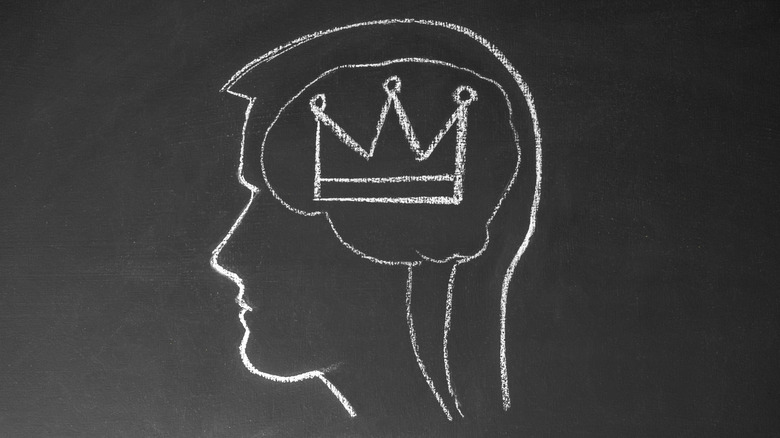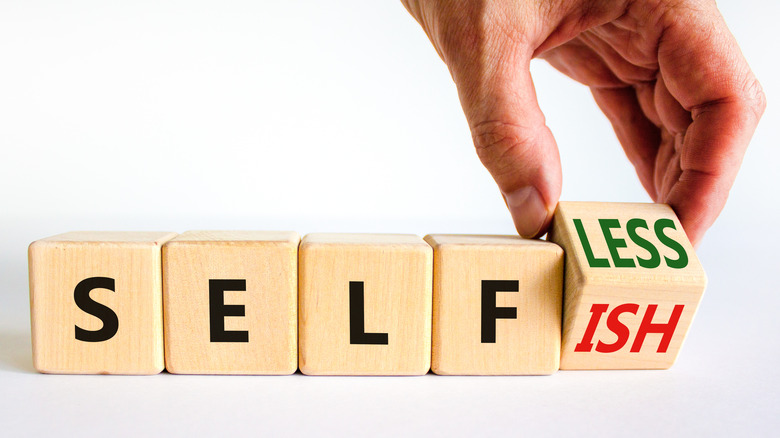What It Really Means When You Have Narcissistic Personality Disorder
From selfies to Kanye, narcissism is having a moment in popular culture. Teodora Zareva reports in The Big Think that, in recently published books, singular first-person pronouns like I, me, and my appear more frequently than collective first-person pronouns like we and us. She asks, is America experiencing a "narcissism epidemic?"
A growing number of psychologists say no, according to Psychology Today. True narcissism is and always has been rare, affecting just 1% percent of the population, and that number has remained stable since researchers began measuring such things. While the term may be overused, narcissism simply refers to a spectrum of traits that varies from person to person (via Psychology Today). Everyone displays these traits at one time or another, and only when they begin to impair a person's day-to-day existence do they transform into narcissistic personality disorder.
"Narcissism," developmental psychologist Eddie Brummelman tells Psychology Today, "is a continuum, and the disorder sits at the very end." Characterized by a lack of empathy, a need for attention, and repeated behaviors of grandiosity, narcissistic personality disorder must be diagnosed by a professional based on the criteria listed in the Diagnostic and Statistical Manual of Mental Disorders (DSM–5).
Narcissists have an inflated sense of self that goes far beyond self-esteem
Individuals diagnosed with NPD have an exaggerated self-perception (via Mayo Clinic). They walk through life with an air of entitlement, demanding praise and recognition, even if it's unwarranted. They may obsess over fantasies of wealth, power, and success, placing themselves among people they consider as unique as they are. Narcissists also ruthlessly pursue what they want, no matter the consequence to other people, often leaving a string of victims of narcissistic abuse in their wake.
These behaviors are entirely separate from self-confidence. According to the Rosenberg Self-Esteem Scale, self-esteem is a person's overall sense of self-worth, and high self-esteem means a person regards herself positively. A person with a healthy sense of self-esteem has the confidence to acknowledge and grow from mistakes.
Narcissists, on the other hand, believe they are better than other people, and this twisted logic eases their discomfort when they are challenged (via Psychology Today). This blind ego doesn't permit any room for self-reflection or improvement, which is the primary reason narcissists don't seek treatment for the disorder.
Behind the bluster of a narcissist lies a fragile ego
Psychologists speculate that narcissists preen and boast to make up for the fact that they actually feel inferior (via Psychology Today). Narcissists often harbor private feelings of shame, and instability in their sense of self make them extra sensitive to criticism. Because everything hinges on their inflated self-image, narcissists cannot tolerate distress and are envious of others' successes. That's why "when they don't get the admiration they crave, they feel ashamed and lash out aggressively," Eddie Brummelman told Psychology Today.
Why narcissists see the world in this way is not entirely understood. The specific root causes of narcissism are unknown, but genetics too may play a role (via StatPearls). Most research on NPD suggests that negative childhood experiences most likely contributed to these behaviors in adulthood. In an ironic twist, research likewise shows that extra praise — or parental reinforcement of the idea that a child is exceptional — can also foster narcissistic behaviors. And although narcissistic traits are more common in younger people, just because an adolescent displays narcissistic traits does not mean that person will be diagnosed with NPD later in life.
Not all narcissists look the same
According to Psychology Today, narcissism breaks down into two categories: overt (grandiose) and covert (vulnerable). While American culture at large associates narcissism with characters like Meryl Streep's Miranda Priestly in "The Devil Wears Prada," not all narcissists display those classic, extroverted, bigger-than-life traits.
Psychologist Craig Malkin tells Psychology Today that "vulnerable" narcissists are highly introverted individuals with many temperamental sensitivities who fall apart when criticized and demand constant reassurance from those around them. Another covert form of narcissism, "communal" narcissists do good things for the wrong reasons — to be rewarded for all the good things they've done. Take Tahani from "The Good Place." Whitney Derman writes for Abuse Refuge Org that Tahani demonstrates communal narcissism by giving to charity so she can be showered by the affections of the wealthy and powerful — not because she genuinely cares.
No matter which type of narcissist you may encounter, they share an inherent belief that their actions and thoughts are superior to others. These false beliefs make being in a relationship with a narcissist incredibly difficult and unsatisfying. If someone you love is a narcissist, here are a few tips on how to break up while staying safe and sane.



